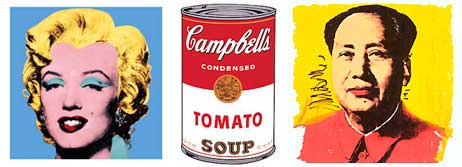Andy Warhol - a master of color

I couldn’t resist twisting Andy Warhol’s quote after seeing the first museum survey exhibition of the work he produced during his final years. It was worth taking the train to Fort Worth during my brief stay in Dallas to see "Andy Warhol: The Last Decade" at the Modern Art Museum.
If truth be told, I was more motivated to see the Ando-designed Museum – a cluster of floating pavilions - than the Warhol exhibit. The experience turned out to be a clash of the colorless world of Ando’s concrete and steel structures and the riotous colors of Warhol’s canvases and prints. A powerful juxtaposition of geniuses and color theory!
Prior to seeing this exhibit, I had always thought of Warhol (1928–1987) as an artist with a crayola coloring-book approach to color. Any color would work as long as it was a raw primary or secondary color. The image – Marilyn Monroe, Mao, or shoes – was the focus. In fact, we recognize his position in art history as the man who transformed soup cans and other icons of pop culture into true art.
Now we have this exhibit ... and it exposes his mastery of color and techniques on a scale that you have to see to believe. For example, “Christ 112 Times /Detail of The Last Supper” is an acrylic with silkscreen ink on canvas the size of a bus. 112 small panels of Jesus’ face (from “The Last Supper”) in yellow on black fill the painting. Yellow and black!
On a smaller scale, his series of “Shadows” panels (about 4’ x 6’ each) contain a single geometric colored shape that seems to glow from within. They actually rivaled the mystical quality of the Rothko painting in the permanent collection below the Warhol exhibit.
By the way, during the last decade of his life, Warhol created more artwork - and on a vastly larger scale - than during any other phase of his 40-year career. This exhibit was a rare opportunity to view 55 works that had never been seen together for the first time.
It seems that his color sensitivity was making history in a way that Andy may not have realized. But then again, maybe he did. As it turns out, he was a closet Catholic and - perhaps in the same sense that he was a master of puns - he loved to play with color as much as the object during his last years.

